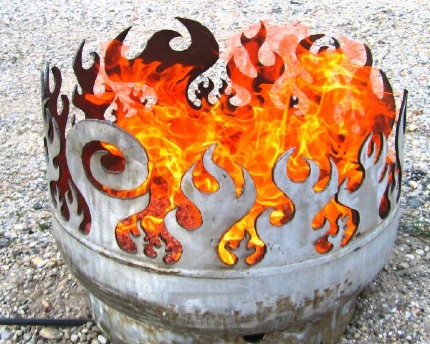The Beach Burner Portable Bonfire by John T. Unger
Artist, entrepreneur and creative rock star John T. Unger left such a great comment on the post The Dark Side of Creativity: Burnout we thought it deserved a wider audience. If you’ve not read it already, you might like to read the creative burnout post to get the context before reading John’s response.
Yeah, I’ve definitely had all these symptoms [of creative burnout] at one time or another, and learning to deal with them effectively took a long time.
There’s one more symptom that I think you missed, which is that when you reach the stage of creative burnout, there’s a fear that you may never get back to a state of healthy creative production, or maybe even *any* creative production… I’ll give a couple examples of that fear, and then show how overcoming the fear helped me to overcome all of the other symptoms as well.
My first first creative career was as a poet and writer. For about 15 years, that was my main gig. I had some moderate success critically if not financially. Every now and then, I’d reach a wall and stop writing. The words just seized up and I would begin to fear that they weren’t going to come back again. Ever. I’d start looking at the most recent piece I had written and wondering whether it was in fact the last piece I’d ever write. It’s difficult to describe just how terrifying this can be if your whole life is wrapped up in identifying with the work… It’s like being erased. It felt like a degenerative disease where I retained just enough awareness to watch as my consciousness melted away.
There were a number of specific things I could do (diving into the work of other writers I admired, revisiting my unfinished work and notes, or taking a sudden turn to new subject matter) to try to get the juices flowing again – I think most creative people have got some system that works for them sooner or later. But, most of the time when you’re burned out, the best you can do is stare into space… it isn’t going to get better until you’ve let some time go by and recovered your balance. Just like being sick. While you’re in that state of fear, nothing makes you feel any better until you manage to become conscious of it and see it as a cyclical event that *will* pass because it has come and gone before. Unfortunately, the only way to be aware of it as a cycle is to learn by going through it a couple times.
The same cycle has happened to me as a visual artist, as a blogger, as a coder, as a designer… basically in any creative endeavor I’ve taken seriously. When I switched to visual art from poetry, I was just as terrified the first time or two that I realized I hadn’t made any art for a while. And then I remembered having the same experience with writing and recognized the cycle for what it is. Having seen it before made me less afraid of it, and knowing that I had experienced it in more than one creative discipline helped me to realize that if I was finished with what I had to say in one medium, I could always try bringing the creative process to yet another medium.
How does this relate to the other symptoms above? Essentially, if you can make down time a part of your creative process and recognize it as a naturally occurring break, it will help you to keep the other obsessive behaviors in check. When your creative mind feels blocked, it’s probably time to take a rest, step back and reassess your work to date, look for new ideas or challenges, pay some attention to the relationships or obligations you may have ignored while in the white heat of working, etc. Try to see it it as a good thing, as a cycle, as a balance, as a safety measure. Hell, as a vacation even.
Trying to force it isn’t gonna do you any good. Put your stuff away and ignore it for a bit. Do other stuff. If you’re really wired for creative work you will eventually get bored and start some small project just to amuse yourself, and before you know, the project has grown huge, become something cool and inspiring, and generated ideas for yet more projects. There you go, you’re back!



Yes John, “creative burnout” is very real. Great article and sharing of your life experience.
Just to let you know, my book, “Letting Go With All Your Might” is all about the cycle of being in the flow, losing it and regaining balance again.
I created an 11-Stage “Redecisions Model for Change” illustrated in the book that “shows” how this cycle looks and works, and 40-exercises to help the reader resolve what’s past and step into the new.
Thank you again for your meaty and important postl
Letting Go… can be found at http://www.drdeclutter.com/bookstore/letting-go-book
Have a wonderfully creative day!
Kim Wolinski, MSW
“Dr. DeClutter”
twitter.com/drdeclutter
Absolutely agree!
Our creativity is in the zone of flow – it is not an endless machine.
It needs time to be feed from life. In other words we need to feed our creative expression with experiences that will give it the necessary fuel to get going again.
Often after a break I am ‘sooo’ full of ideas I think I’ll never get them down on paper fast enough. I have learned to trust this organic process now and feel better for doing so. After all your creative energy like other parts of you needs to be honoured and treated properly, yes?
Good response and blog Sir, as usual!
I totally agree with that. This “ebb and flow” can be found in all aspects of our lives.. sleep, hunger, exhaustion, lust, … Learning to accept that and living with it in balance helps you get rid of stress and anxiety.
I can recommend the book “The Art Of Learning: An Inner Journey To Optimal Performance” by Josh Waitzkin. It’s quick read but and it talks about that phenomenon and others and how to live with it in harmony.
http://web.me.com/aaronandpatty/What_the_Duck/Comic_Strips/Entries/2008/11/5_WTD_601.html – funny how cartoons can sum everything up.